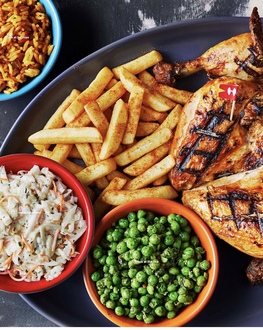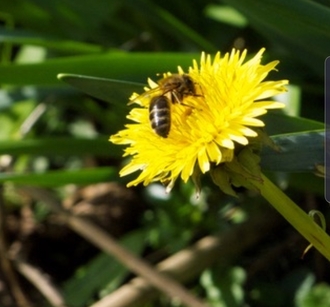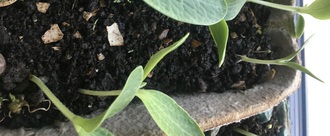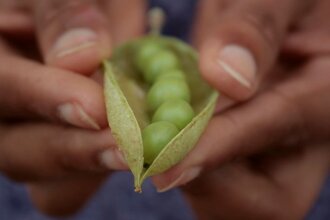- Featured
- Animal Rights
- Anti-racism
- Arts & Culture
- Children
- Climate
- Corporate accountability
- Crime
- Disability rights
- Economic
- Education
- Environment
- Food and Sustainable Production
- Gender Equality
- Governance and Transparency
- Health
- Housing
- LGBT rights
- Mental health
- Northern Ireland
- Planning
- Privacy and Data Protection
- Rural Inequality
- Social Justice
- Trade
- Transport and Infrastructure
- Workers' Rights
- More
-
Create halal options in Nandos IrelandThis is important because there are at least 100,000 Muslims in Ireland , a forever growing population. Nandos UK have 434 Nandos outlets and 76 of them are Halal . Nandos have at least 9 restaurants in Dublin alone , yet none of them are halal or provide halal options. We need at least one Nandos with halal options in this country . Ireland claims to be an inclusive and diverse country , yet were one of the only dietary groups in the country that are not catered to in mainstream restaurant and fastfood chains. This is 2021 . We need these options. We need this change in Ireland. We would like Nandos Ireland to set the standard because everyone deserves a cheeky Nandos.1,255 of 2,000 SignaturesCreated by Baisat Alawiye
-
Ag fas le cheile! Say yes to a 100 % Organic, Chemical-free and GMO-free IrelandDear Friends, I just created the petition: Ag fas le cheile! Say yes to a 100% Organic, 100% Chemical-free and 100% GMO-free Ireland. It would mean a lot to me if you took a moment to add your name because: A journey’s end matters not, for it is the journey itself that inspires, enriches and delights. As I took “the road less travelled” 18 months ago, I could not have imagined the amount of learning to be had on this road; for I am now less dependent on certain modern conveniences than I was in May 2019. Now in November 2020, I am • 100% shampoo-free • 100% clothes detergent-free • 100% washing-up liquid free • 100% dishwasher liquid free • 100% all-purpose cleaner free • 99% bin-free. In short, grey water that leaves my house is virtually chemical free with a minimal toxic load to the environment. My garden is 100% Organic, 100% Chemical-free and 100% GMO-free and has been for about 10 years. With the continued support from local Clare businesses and shops, Clare media and a waste prevention grant from Clare County Council, Operation de-Plastification with its “slim your bin or bin your bin challenge” has been able to inform, encourage, support and lead-by-example on the quest to waste reduction, particularly plastic related waste in the shape of single-use plastic bottles and plastic packaging. With the submission to Clare County Council for the Clare Local Development Plan 2022 – 2028 "100% Organic, 100% Chemical-free and 100% GMO-free", I am hoping to sow the seed for a different Clare, and by extension a different Ireland, to highlight a path that has been taken by other countries successfully and to encourage as many people of all ages and guises, including businesses and politicians, to re-think their habits and attitudes in relation to • everyday conveniences • everyday routines • everyday practices to aid the recovery of our planet, with an intact environment which in turn will support our future. The attempt to combine the Operation de-Plastification campaign and the vision for a post-pandemic County Clare, has generated the “ag fás le chéile” petition, where shoppers, sellers and consumers can voice, with their signature, their request for an enduring “green” Ireland. The petition aims to address all people living in Ireland: • Shoppers: we want to buy local, sustainable, affordable, nutritious, delicious, organic, plastic-packaging-free, chemical-free and gmo-free goods • Sellers: we want to sell local, sustainable, affordable, nutritious, delicious, organic, plastic-packaging-free, chemical-free and gmo-free goods • Consumers: we want to enjoy local, sustainable, affordable, nutritious, delicious, organic, plastic-packaging-free, chemical-free and gmo-free goods Assuring our environment’s and our survival, “the road not taken” may lead to a life and life-style where less is more, as less is more than enough in my experience. With the kindest regards, Cornelia Wahli Operation de-Plastification Campaign Slim your Bin or Bin your Bin Challenge “Ag fás le chéile” Petition ____________________________________________________________________ https://my.uplift.ie/petitions/ag-fas-le-cheile-say-yes-to-a-100-organic-chemical-free-and-gmo-free-ireland Real change happens when everyday people like you and I come together and stand up for what we believe in. Together we can reach lots of people and help create change around this important issue. After you've signed the petition, could you also take a moment to share it with others? It's really easy – all you need to do is forward this email. Thank you!73 of 100 SignaturesCreated by cornelia wahli
-
Stop Unsustainable Fishing in Irish Inshore WatersIn 2018 the Irish government implemented a ban on trawlers greater than 18m to fish within 6 nautical miles of the Irish coast. The High Court has since overturned this ban with the current law now allowing boats of any size to fish anywhere with no regulations or quotas enforced. Not only is this detrimental to inshore ecosystems, smaller Irish fishing communities cannot compete with large unregulated trawlers coming inshore. Bantry Bay in West Cork is one particular area that is currently at the detriment of unsustainable fishing practices. Although Bantry Bay is a designated Special Area of Conservation (SAC), drone footage of pair trawling was captured here in October 2020. This area is home to marine invertebrates, fishes, elasmobranchs, seabirds and marine mammals. While pair trawlers are fishing legally, with no regulations or quotas, they are fishing at an unsustainable rate and removing a critical food source (sprat and herring) for many larger marine species. Additionally, 80% of Irish fishing vessels are less than 12m and cannot compete with large trawlers. We need the Irish government to support small Irish fishing communities and protect our marine environment and its inhabitants. The Minister of Agriculture, Food and Marine , Charlie McConalogue has recently lodged an appeal against the High Court’s decision to allow large trawlers to fish within 6 nautical miles of the Irish coast. We call on the High Court to reinstate this ban on trawlers greater than 18m to fish within 6 nautical miles of the Irish coast.197 of 200 SignaturesCreated by ORCA Ireland Ocean Research & Conservation Association

-
RE-OPEN COCO MARKETSGovernment guidelines regarding Covid Level 5 and Essential Retail Outlets clearly state "markets that, wholly or principally, offer food for sale" can open for business. However, Dun Laoghaire Rathdown County Council has announced the closure of Dun Laoghaire People's Market and Marlay Park Market. This action will deprive traders of much needed income in what is traditionally their busiest time of the year. Furthermore, it will deprive consumers who look to these markets as their location of choice for the weekly purchase of organic & artisan produce.1,037 of 2,000 SignaturesCreated by MAST Limited
-
Stop Development on Gallwey's Hill TramoreThe former owner of this site should be commemorated as someone who triumphed over adversity, by dedicating this iconic viewing spot in Tramore to those who struggle due to exclusion. An accessible community garden with coffee shop would offer all in the town and beyond, a space and workplace for inclusion along with environmental appreciation.910 of 1,000 SignaturesCreated by Una Dunphy
-
Allow off-grid, low impact housing in IrelandIn Ireland our individual ecological footprint is approximately 5.2 Global Hectares per Capita (ghc) but the Planet’s actual capacity is only 1.8 ghc: we are living as if there are almost three Planet Earths. This way of life is not only contributing to mass extinction, pandemics and extreme economic inequalities, it means that, in all likelihood, our country will be uninhabitable for our grandchildren. A One Planet Development scheme would give people the option of moving out of the city and into the countryside to pioneer a way of life that goes some way towards bringing the human-nature relationship back into balance. It would allow people to build small low-impact dwellings, to establish community and to work with the land in a regenerative way to bring systemic change to our food systems.4,411 of 5,000 SignaturesCreated by Róisín Dexter
-
Stephen Donnolly: Demand meat factory owners protect people from COVID-19The people who produce our food are often treated the worst in society. Now, they're being exposed to COVID-19 at work, and bosses are allowed to get away with it. It's time Minister for Health Stephen Donnolly took action to make meat factory bosses protect the people who work there.46 of 100 SignaturesCreated by Emily Duffy

-
Say No to Mow in Co. KildareDuring this pandemic, many of our green areas have been allowed to grow wild, with no council mowing ongoing. Green areas have been allowed to flourish, so that we have yellows, purples, blues, whites, as well as lush green grass. When council workers are allowed to return, we want to keep wild the areas that don't require mowing (e.g. grass verges, fields in which only the edges are walked).76 of 100 SignaturesCreated by Sorcha Grisewood
-
Biodiversity Crisis in IrelandThis is of critical importance right now due to the declining number of insect species in this country as a result of poor practices by many people who simply are unaware of the adverse effects of their behaviour. Healthy biodiversity boosts ecosystem productivity where each species, no matter how small, all have an important role to play. In Ireland biodiversity is essential for many reasons including the below: • Soils formation and protection • Nutrient storage and recycling • Pollution breakdown and absorption • Contribution to climate stability • Maintenance of ecosystems • Food • Medicinal resources • Wood products • Ornamental plants • Diversity in genes and species • Social benefits, such as research, education, recreation, cultural values and tourism1,430 of 2,000 SignaturesCreated by Suzanne Murphy
-
A Community Garden in the Clonskeagh/Dundrum AreaThe garden's aim is to produce local food and teach gardening techniques. Empowering people to produce their own food is especially important during this time of financial, societal and climate upheaval. The community garden will be totally run by volunteers, and consistently monitored by a committee. Benefits of Community Gardens Health Community gardens increase the public access to affordable, fresh, healthy food (1). People who participate in community gardens, on average, increase their fruit consumption by 10% (1) and areas with community gardens have less obesity (3). The act of gardening is a form of exercise and so participation in community gardens promotes physical activity (1,3). Urban agriculture is also linked to reductions in stress and positive mental health especially for those suffering from mental health problems (3). Community gardens generally promote public health and improve quality of life (1) Community Community gardens promote connection with the earth and with other people (7). Working with each other and sharing resources and time builds social relationships and stronger communities. Participation in community gardens is linked with increased voter registration, civic responsibility, and reduced rates of crime (3). Compared to other communal green spaces community gardens are small scale, low cost and highly used. Community garden areas of public parks see more visits than any other part of the park (2). Resilient Food System and Sustainability Urban agriculture increases food accessibility and local food security (3,1). This is of great significance to food insecure households (3). According to Safefood.eu, one in ten households in Ireland in 2018 suffered from food poverty (8). People who grow their own food, or are a part of a community garden save money by supplementing the food they buy (3). In Seattle growers were able to supplement their produce by 30-40% (3). Many urban agriculture projects produce more than they can consume and donate the excess food to community members and food banks (3). Increasing urban agriculture increases the resilience and sustainability of the city’s food system and reduces reliance on imported produce (3). This is especially relevant in the wake of the coronavirus. Local food is generally considered to be more sustainable because of the carbon cost associated with travel. Education Community gardens can be a great platform for skill shares and events like gardening workshops, and gardening tutoring, taste-testing events or discussion events (1). In one study 20% of students that started gardening in the community garden began gardening at home (1). Community gardens can be used by local schools. This is greatly beneficial for children as gardening helps develop fine motor skills and teaches them about patience, science and where their food comes from (2). Community gardens can host a variety of workshops and help people develop tangible agricultural and organisational skills (3). References 1.Community Gardens: Lessons Learned From California Healthy Cities and Communities | Joan Twiss, MA, Joy Dickinson, BS, CHES, Shirley Duma, MA, Tanya Kleinman, BA, Heather Paulsen, MS, and Liz Rilveria, MPA 2. Community Gardening By Katherine L. Adam NCAT Agriculture Specialist Published January 2011, 3.The Intersection of Planning, Urban Agriculture, and Food Justice: A Review of the Literature Megan Horst, Nathan McClintock & Lesli Hoey 4. Multifunctional Urban Agriculture for Sustainable Land Use Planning in the United States Sarah Taylor Lovell 5.Alma Anne Clavin (2011) Realising ecological sustainability in community gardens: a capability approach, Local Environment, 16:10, 945-962, DOI: 10.1080/13549839.2011.627320 6.The motivations and experiences of community garden participants in Edinburgh, Scotland David McVey, Robert Nash & Paul Stansbie 7.It takes a garden: Cultivating citizen-subjects in organized garden projects Mary BethPudup 8. https://www.safefood.eu/News/2019/New-research-reveals-households-on-low-incomes-need-to-spend-up-to-1-3-of-take-home-income-to-afford.aspx93 of 100 SignaturesCreated by Saoirse Sheehy Ariff
-
Community Objection to a Quarry in RaphoeBonar's Quarries are seeking permission for 25 years to open an old quarry that has already adversely affected the lives of residents of this heritage town under planning number 1952015. It has gone unnoticed by most of the community during the COVID-19 pandemic but those who remember the building damage, noise pollution, air pollution and misery caused when this quarry was last operated will not want it to return. Unbelievably, the proposal is within just 800 metres of some 23 homes, a secondary school, businesses, multiple farms and within 1 km of Raphoe, a heritage town with a population of over 1000 people and with huge historical and cultural significance. Raphoe is also home to three other schools, a cathedral, a chapel, churches, numerous businesses including a livestock mart, a tourism attraction in Oakfield Park, forestry and many farms. We oppose the noise, dust, vehicular traffic, the safety record of the applicant, water pollution, vibration, the location and the release of any poisonous landfill leachate into aquifers, and second the views of the 18 page objection already lodged. There are many more suitable locations for a quarry but this one, on the edge of our town, simply must not go ahead. Therefore we need as many people as possible to CLICK BELOW TO BACK THIS PETITION and oppose living beside a functioning quarry in Raphoe for the next 25 years.462 of 500 SignaturesCreated by Raphoe Community
-
Allow some access to Community Gardens and Allotments by plot holders during Covid-19Gardens have the capacity to maintain the physical distancing and hygiene practices necessary to combat the spread of COVID-19. Community Gardens and Allotments provide for a wide scope of citizens, including low-income and marginalised people, allowing them access to organically grown, sustainable, healthy food, which might be out of their budget to purchase otherwise. We are at the start of growing season and many rely on food crops from their extended gardens to sustain them in the coming months therefore the closure notice served at the end of March hits many with additional frustration on top of ongoing situation in the society. Complete closure order from the council will inevitably lead to unnecessary food waste, but what is the worst - depression may take people's lives in an already stressful situation when many lost their jobs, or part of income, due to Covid-19. We must protect the vulnerable who find refuge and hope in growing a garden. The Local Councils must work towards improving access to HEALTHY, LOCALLY grown food in a SAFE space, while maintaining necessary precautions regarding spread of Covid-19. We can’t afford to deepen the antagonism in our society, particularly during a public health crisis. COMMUNITY GARDENS AND ALLOTMENTS ARE ESSENTIAL.1,573 of 2,000 SignaturesCreated by Aga Mizuno












